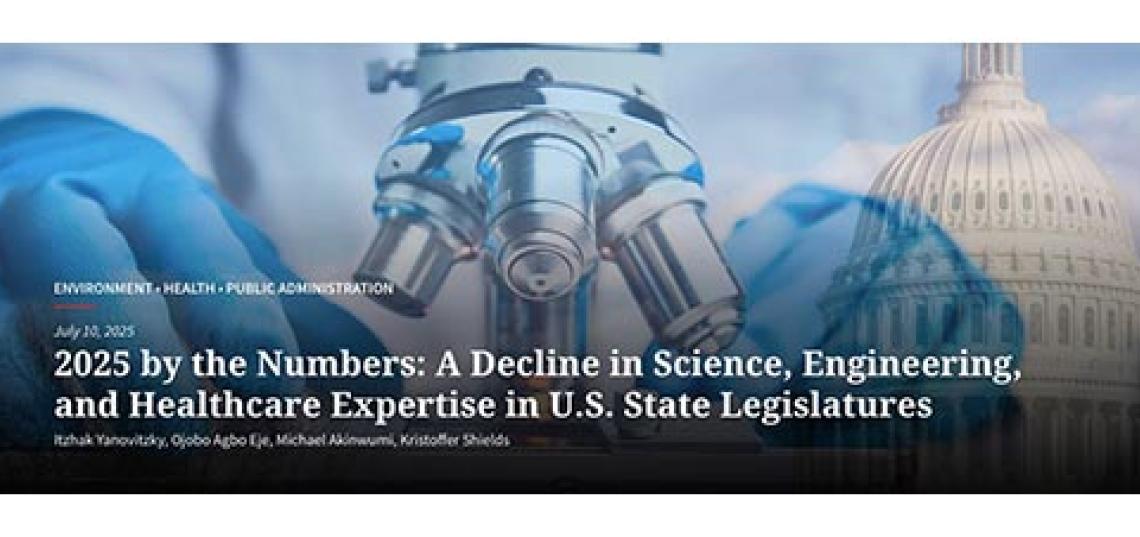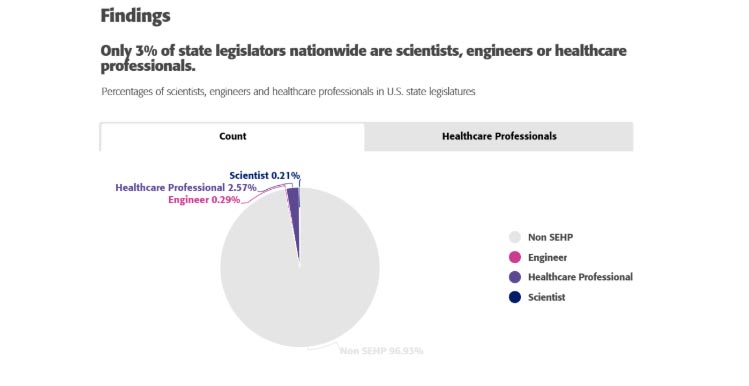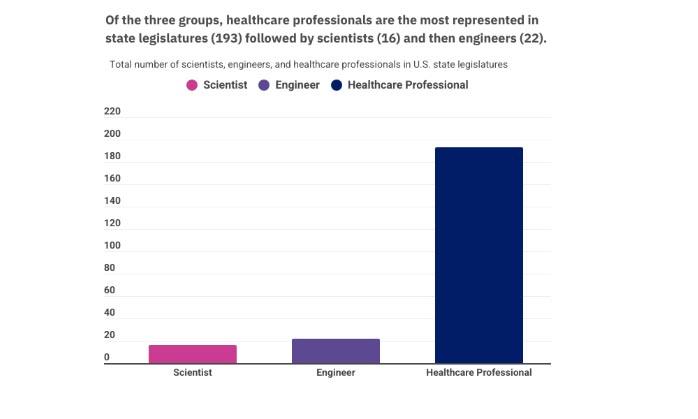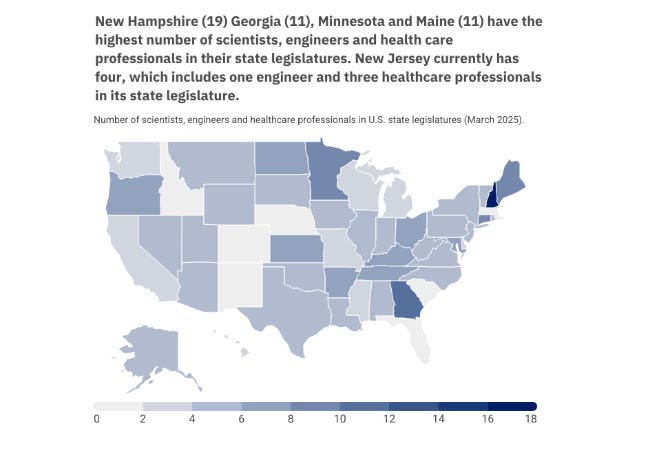
By Itzhak Yanovitzky, Ojobo Agbo Eje, Michael Akinwumi, Kristoffer Shields
The Scientists in State Politics Database is a detailed, publicly accessible inventory of state legislators across the United States with educational or professional backgrounds in science, engineering, or healthcare, hosted by the Eagleton Institute of Politics with support from the New Jersey State Policy Lab. The database helps users identify these legislators, explore their areas of expertise, and analyze their representation based on gender, demography, state, race, and party. In addition to providing users this key information, regular updates to the database’s information allows users to track trends in the number of scientists serving in state legislatures. The most recent update—based on March 2025 data—is a particularly important one. For many states, 2024 was a crucial election year not only at the federal level, but also at the state legislative level. As a result, as states seated their new legislatures in the winter of 2025, there was the potential for much more significant turnover than in previous data updates. This turnover could give some indication of recent trends concerning science in state politics.
Unfortunately, this most recent update reflects a decline in science-based representation from the most recent prior update. Most notably, the percentage of science, engineering, and healthcare professionals serving in U.S. state legislatures dropped from 4.09% to 3.07%, representing a nearly 25% proportional decline in less than one year. While in 2024 there were 309 science-based legislators, this number has fallen to 231 in 2025, out of a total of 7,523 lawmakers nationwide.
While these professionals still contribute a unique and essential perspective to policymaking, especially in areas such as public health, AI regulation, and environmental policy, the sharp decline may signal concerning trends in the election and retention of scientific expertise in legislative bodies. This may also reflect a greater reluctance from scientists to seek elected offices given the highly polarized political environment surrounding science. It is a warning flag worth monitoring.
The Continuing Importance of the Scientists in State Politics Database
As scientific discoveries and technological innovations continue to drive change in many domains of life, having scientific and technological expertise in governance is more than a matter of representation; it is necessary for sound policymaking. The Scientists in State Politics Database is a vital tool for understanding this intersection between science and politics. By grouping state legislators with backgrounds in science, engineering, and healthcare, the database provides an overview of technical expertise in government and the potential for evidence-based, scientifically informed policymaking at the state level. It also tracks opportunities to increase the likelihood that scientific knowledge is considered in policymaking processes and equip science supporters with relevant scientific evidence needed for them to engage with other policymakers.
Legislators with a scientific background not only bring technical expertise to policymaking but also act as ambassadors for the scientific community. Their expertise and lived experience can help to bridge science with policy, often advocating for public trust in science. Finally, beyond documenting present legislators, the database is an important resource for those considering public service careers, inspiring future candidates from STEM and health-related fields to see themselves in governance roles, and for advocates to encourage recruitment of such individuals. For all of these reasons, it is important to continue tracking the data and noting the trends.
Given the importance of the data, the process behind its collection and verification remains rigorous, systematic, and transparent. The classification of legislators as scientists, engineers, or healthcare professionals is based on publicly available criteria accessible through the project website and reflects clear definitions around education and occupational history.
For this March 2025 update, as in prior updates, data collection relied on legislators’ biographical, professional, and educational information from the KnowWho Database. The dataset was again cleaned and merged using Python and Excel-based tools, including PID (Personal Identifier) tracking for legislators. Legislators who had left office before March 2025 were removed to ensure an accurate and current reflection of those actively serving.
As with past updates, data were analyzed across demographic characteristics, party affiliation, and professional domains. The full dataset includes all 7,523 lawmakers serving in state legislatures as of March 2025, forming the basis for trend analysis across time and regions.
Exploring the March 2025 Results
The March 2025 update to the Scientists in State Politics Database shows a significant downward trend in the representation of scientific, engineering, and healthcare professionals in U.S. state legislatures. Out of the 7,523 total lawmakers currently serving, 231 were identified as having science-based backgrounds, which represents 3.07% of the total. This marks a full percentage point drop from the 4.09% recorded in September 2024, representing a 25% proportional decline in less than a year.
Breaking this down by the professional sector, healthcare professionals continue to make up the majority of science-based legislators, with 193 individuals (down from 211 in 2024). This 8.5% drop represents the steepest numerical decline. Scientists, which include those with backgrounds in fields such as biology, chemistry, public health, and data science now number 72 total, a slight drop from 74 in 2024 (a 2.7% decline). Engineers saw the most pronounced proportional decrease; just 22 engineers remain in 2025, compared to 26 in 2024, marking a 15.4% drop in one year. These declines, while relatively small in absolute numbers, could have significant implications for policymaking capacity in areas such as healthcare delivery, AI and data ethics, infrastructure planning, and environmental regulation.

As in previous years, men continue to represent a slight majority of science-trained legislators. In 2025, male legislators account for 122 of the 231 individuals with science-based backgrounds. Among them are 39 scientists, 18 engineers, and 65 healthcare professionals. Female legislators make up 109 of the science-based group; this includes 33 scientists, 4 engineers, and 72 healthcare professionals. This represents a decline across both genders compared to 2024, when male science-based legislators numbered 164 and female 141.
The healthcare category, which comprises the majority of science-based legislators, is diverse in terms of profession. Among the 193 legislators in this group are physicians (52), registered nurses (65), pharmacists (8), dentists (11), and other healthcare professionals (e.g., public health experts, clinical specialists, mental health providers) (57). This shows a slight decline in nearly every category, with pharmacists and dentists experiencing the most notable reductions relative to their 2024 numbers.

State-Level Highlights
One of the key features of the Scientists in State Politics Database is the ability to analyze regional variation in scientific expertise across state legislatures. The March 2025 data reveal a mixed landscape, with some states maintaining or even increasing their representation of science-based lawmakers, while others show marked declines. Despite the national decrease, New Hampshire continues to lead with the highest number of science-based legislators (20), slightly down from 21 in 2024 but still proportionally strong relative to its legislature size. Georgia, which had 15 in 2024, remains steady at 15, while Maryland, with a historically strong presence, has decreased slightly to 10. Other states with notable concentrations include California (14 down from 17), New York (11 down from 13), Texas (unchanged at 10), Colorado and Illinois (9 each, slightly decreased from 10). These states generally feature larger legislatures and robust academic, research, and healthcare infrastructures, which likely contribute to the number of technical professionals entering public service.
Some states saw noticeable reductions in science-based representation between September 2024 and March 2025. Connecticut fell from 9 to 6 science-based legislators, Minnesota dropped from 8 to 5, a 37.5% decline; Michigan saw a decline from 12 to 8, the largest numeric drop outside the top three states. These shifts could be attributed to election turnover or decisions not to seek re-election; these trends could be an opportunity for subsequent qualitative follow-up.

As of March 2025, six states had no identifiable scientists or engineers serving in their legislatures, and only minimal healthcare representation. These include South Dakota, Wyoming, Idaho, Alabama, Arkansas, and West Virginia. The lack of scientific expertise in these legislatures raises questions about technical capacity in policymaking, particularly in states that face significant public health or infrastructure challenges.
One further trend is worth highlighting: urbanized states with high research and medical infrastructure like Massachusetts, Washington, and Illinois retained science-based lawmakers, compared to rural or mid-sized states, which are experiencing more turnover and steeper declines.
Looking to the Future
Scientists who serve as policymakers bring not only their technical expertise but also established relationships within the scientific community, helping to bridge science and governance. They have the potential to introduce evidence-based decision-making and foster policies that are informed by data, science, and innovation.
The Scientists in State Politics Database will continue to serve as a tool for understanding and shaping the intersection of technical expertise and political leadership. With its user-friendly platform and comprehensive data, the database empowers policymakers, researchers, and citizens alike to engage with the dynamics of state politics and advocate for meaningful representation.
Learn more about the Communication Department at the Rutgers School of Communication and Information on the website.
This article was originally posted to the Rutgers New Jersey State Policy Lab website on July 10, 2025.
